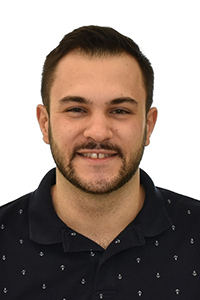 During his time at UBC, Joshua (Josh) Ferreira (he/him) was honored to represent his class as the Co-President of the Occupational Therapy Student Society. In this role, he served as Master of Ceremonies in the 2022 MOT Capstone Conference and Co-Chair of the 2023 MOT Capstone Conference and was fortunate enough to receive the Sarah Brabyn Memorial Award based on leadership, community involvement, and strong collegial spirit. Josh hopes to continue to expand his knowledge and skills in the field of occupational therapy and become a mentor to other new therapists in the future. Outside of professional endeavors, you can find Josh hiking in the woods, skiing in the mountains or going for a walk with a good cup of coffee.
During his time at UBC, Joshua (Josh) Ferreira (he/him) was honored to represent his class as the Co-President of the Occupational Therapy Student Society. In this role, he served as Master of Ceremonies in the 2022 MOT Capstone Conference and Co-Chair of the 2023 MOT Capstone Conference and was fortunate enough to receive the Sarah Brabyn Memorial Award based on leadership, community involvement, and strong collegial spirit. Josh hopes to continue to expand his knowledge and skills in the field of occupational therapy and become a mentor to other new therapists in the future. Outside of professional endeavors, you can find Josh hiking in the woods, skiing in the mountains or going for a walk with a good cup of coffee.
What drew you to the Master of Occupational Therapy (OT) degree at UBC?
Occupational Therapy is a profession that incorporates physical, psychological, and environmental influences on an individuals’ ability to participate in meaningful participation of valued occupations. As a therapist working alongside individuals you empower and support them to reach their goals and have the privilege to see them succeed in their journey. Specifically, the UBC program emphasized a well-rounded education in Occupational Therapy with multiple placement opportunities in diverse fields of practice.
How has studying in the MOT program made an impact on you?
Studying in the MOT program has been a life-changing experience that has provided me with a supportive community of colleagues, mentors, and close friends that will forever be dear to me. This program taught me evidence-based practice, academic knowledge, and professional experience, as well as challenged me to grow on a personal level.
What was something you learned in the MOT program that surprised you?
When I started the MOT program, I anticipated gaining expertise in a well-respected profession and working in healthcare. But what I didn’t know was the way it would change how I view the people, environment, and occupations in my everyday life. I found the applicability of the profession was everywhere. Whether it was providing ergonomics tips to friends, assisting my elderly grandparents to age in place, or admiring a particularly accessible bathroom. I was surprised to find occupational therapy principles as far as I could see.
What is your favorite memory from your time at UBC?
My favorite memory at UBC must be the summer barbecue our class put on the week before classes started. During this event, I immediately felt at home talking and meeting my new classmates and listening to the countless stories of “How did OT find you?”. Despite the various paths and diverse life experiences that brought us together, I’ve never felt more comfortable with sixty-three complete strangers.
Where do you find inspiration?
I find inspiration in the moments spent with others, whether in my personal or professional life. The positive connections I have with family, friends, and clients, knowing that through our interactions I’ve made a difference in someone’s journey, whether for a brief moment or a lasting impact, bring me immense joy.
What does a healthy society mean to you?
A healthy society to me is based on the foundational principles of respect, autonomy, and community. Respect and autonomy allow us the freedom to be the most authentic versions of ourselves and acknowledge everyone’s unique lived experiences, life paths, and identity. Community brings us together towards a common goal or initiative and fosters a sense of shared belonging and collaboration that is essential in a healthy society.
What are your plans after graduation?
After graduation, I plan to start my career in the public healthcare system and continue to expand my knowledge and skills as an Occupational Therapist. I’m eager to learn from peers, mentors, and clients in the field about how best to serve in this new-found role.
Comments are closed, but trackbacks and pingbacks are open.